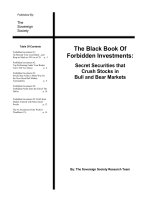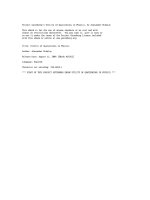The Project Gutenberg E Book of The MarketPlace, by Harold Frederic pdf
Bạn đang xem bản rút gọn của tài liệu. Xem và tải ngay bản đầy đủ của tài liệu tại đây (2.1 MB, 1,047 trang )
The Project Gutenberg EBook of The Market-
Place, by Harold Frederic
This eBook is for the use of anyone
anywhere at no cost and with
almost no restrictions whatsoever. You
may copy it, give it away or
re-use it under the terms of the Project
Gutenberg License included
with this eBook or online at
www.gutenberg.org
Title: The Market-Place
Author: Harold Frederic
Release Date: July 6, 2008 [EBook #298]
Language: English
*** START OF THIS PROJECT GUTENBERG EBOOK
THE MARKET-PLACE ***
Produced by John Hamm, and David Widger
THE MARKET-
PLACE
by Harold Frederic
CONTENTS
CHAPTER I
CHAPTER II
CHAPTER III
CHAPTER IV
CHAPTER V
CHAPTER VI
CHAPTER VII
CHAPTER VIII
CHAPTER IX
CHAPTER X
CHAPTER XI
CHAPTER XII
CHAPTER XIII
CHAPTER XIV
CHAPTER XV
CHAPTER XVI
CHAPTER XVII
CHAPTER XVIII
CHAPTER XIX
CHAPTER XX
CHAPTER XXI
CHAPTER XXII
CHAPTER XXIII
CHAPTER XXIV
CHAPTER XXV
CHAPTER XXVI
CHAPTER XXVII
CHAPTER I
THE battle was over, and the victor
remained on the field—sitting alone with
the hurly-burly of his thoughts.
His triumph was so sweeping and
comprehensive as to be somewhat
shapeless to the view. He had a sense of
fascinated pain when he tried to define to
himself what its limits would probably be.
Vistas of unchecked, expanding conquest
stretched away in every direction. He held
at his mercy everything within sight.
Indeed, it rested entirely with him to say
whether there should be any such thing as
mercy at all—and until he chose to utter
the restraining word the rout of the
vanquished would go on with multiplying
terrors and ruin. He could crush and
torture and despoil his enemies until he
was tired. The responsibility of having to
decide when he would stop grinding their
faces might come to weigh upon him later
on, but he would not give it room in his
mind to-night.
A picture of these faces of his victims
shaped itself out of the flames in the grate.
They were moulded in a family likeness,
these phantom visages: they were all
Jewish, all malignant, all distorted with
fright. They implored him with eyes in
which panic asserted itself above rage and
cunning. Only here and there did he recall
a name with which to label one of these
countenances; very few of them raised a
memory of individual rancour. The faces
were those of men he had seen, no doubt,
but their persecution of him had been
impersonal; his great revenge was equally
so. As he looked, in truth, there was only
one face—a composite mask of what he
had done battle with, and overthrown, and
would trample implacably under foot. He
stared with a conqueror's cold frown at it,
and gave an abrupt laugh which started
harsh echoes in the stillness of the Board
Room. Then he shook off the reverie, and
got to his feet. He shivered a little at the
sudden touch of a chill.
A bottle of brandy, surrounded by
glasses, stood on the table where the two
least-considered of his lieutenants, the
dummy Directors, had left it. He poured a
small quantity and sipped it. During the
whole eventful day it had not occurred to
him before to drink; the taste of the neat
liquor seemed on the instant to calm and
refresh his brain. With more deliberation,
he took a cigar from the broad, floridly-
decorated open box beside the bottle, lit
it, and blew a long draught of smoke
thoughtfully through his nostrils. Then he
put his hands in his pockets, looked again
into the fire, and sighed a wondering
smile. God in heaven! it was actually true!
This man of forty found himself
fluttering with a novel exhilaration, which
yet was not novel. Upon reflection, he
perceived that he felt as if he were a boy
again—a boy excited by pleasure. It
surprised as much as it delighted him to
experience this frank and direct joy of a
child. He caught the inkling of an idea that
perhaps his years were an illusion. He had
latterly been thinking of himself as
middle-aged; the grey hairs thickening at
his temples had vaguely depressed him.
Now all at once he saw that he was not
old at all. The buoyancy of veritable youth
bubbled in his veins. He began walking up
and down the room, regarding new
halcyon visions with a sparkling eye. He
was no longer conscious of the hated foe
beneath his feet; they trod instead elastic
upon the clouds.
The sound of someone moving about in
the hallway outside, and of trying a door
near by, suddenly caught his attention. He
stood still and listened with alertness for a
surprised instant, then shrugged his
shoulders and began moving again. It must
be nearly seven o'clock; although the
allotment work had kept the clerks later
than usual that day, everybody connected
with the offices had certainly gone home.
He realized that his nerves had played him
a trick in giving that alarmed momentary
start—and smiled almost tenderly as he
remembered how notable and even
glorious a warrant those nerves had for
their unsettled state. They would be all
right after a night's real rest. He would
know how to sleep NOW, thank God!
But yes—there was somebody outside
—and this time knocking with assurance at
the right door, the entrance to the outer
office. After a second's consideration, he
went into this unlighted outer office, and
called out through the opaque glass an
enquiry. The sound of his voice, as it
analyzed itself in his own ears, seemed
unduly peremptory. The answer which
came back brought a flash of wonderment
to his eyes. He hurriedly unlocked and
opened the door.
"I saw the lights in what I made out to
be the Board Room," said the newcomer,
as he entered. "I assumed it must be you.
Hope I don't interrupt anything."
"Nothing could have given me greater
pleasure, Lord Plowden," replied the
other, leading the way back to the inner
apartment. "In fact, I couldn't have asked
anything better."
The tone of his voice had a certain
anxious note in it not quite in harmony
with this declaration. He turned, under the
drop-light overhanging the Board-table,
and shook hands with his guest, as if to
atone for this doubtful accent. "I shake
hands with you again," he said, speaking
rapidly, "because this afternoon it was
what you may call formal; it didn't count.
And—my God!—you're the man I owe it
all to."
"Oh, you mustn't go as far as that—even
in the absence of witnesses," replied Lord
Plowden, lightly. "I'll take off my coat for
a few minutes," he went on, very much at
his ease. "It's hot in here. It's by the merest
chance I happened to be detained in the
City—and I saw your lights, and this
afternoon we had no opportunity whatever
for a quiet talk. No—I won't drink
anything before dinner, but I'll light a
cigar. I want to say to you, Thorpe," he
concluded, as he seated himself "that I
think what you've done is very wonderful.
The Marquis thinks so too—but I shouldn't
like to swear that he understands much
about it."
The implication that the speaker did
understand remained in the air like a
tangible object. Thorpe took a chair, and
the two men exchanged a silent, intent
look. Their faces, dusky red on the side of
the glow from the fire, pallid where the
electric light fell slantwise upon them
from above, had for a moment a
mysterious something in common. Then
the tension of the glance was relaxed—
and on the instant no two men in London
looked less alike.
Lord Plowden was familiarly spoken of
as a handsome man. Thorpe had even
heard him called the handsomest man in
England—though this seemed in all
likelihood an exaggeration. But handsome
he undoubtedly was—tall without
suggesting the thought of height to the
observer, erect yet graceful, powerfully
built, while preserving the effect of
slenderness. His face in repose had the
outline of the more youthful guardsman-
type—regular, finely-cut, impassive to
hardness. When he talked, or followed
with interest the talk of others, it revealed
almost an excess of animation. Then one
noted the flashing subtlety of his glance,
the swift facility of his smile and
comprehending brows, and saw that it was
not the guardsman face at all. His skin was
fresh-hued, and there was a shade of
warm brown in his small, well-ordered
moustasche, but his hair, wavy and worn
longer than the fashion, seemed black.
There were perceptible veins of grey in it,
though he had only entered his thirty-fifth
year. He was dressed habitually with the
utmost possible care.
The contrast between this personage
and the older man confronting him was
abrupt. Thorpe was also tall, but of a
burly and slouching figure. His face,
shrouded in a high-growing, dust-coloured
beard, invited no attention. One seemed
always to have known this face—thick-
featured, immobile, undistinguished. Its
accessories for the time being were even
more than ordinarily unimpressive. Both
hair and beard were ragged with neglect.
His commonplace, dark clothes looked as
if he had slept in them. The hands resting
on his big knees were coarse in shape, and
roughened, and ill-kept.
"I couldn't have asked anything better
than your dropping in," he repeated now,
speaking with a drag, as of caution, on his
words. "Witnesses or no witnesses, I'm
anxious to have you understand that I
realize what I owe to you."
"I only wish it were a great deal more
than it is," replied the other, with a frank
smile.
"Oh, it'll mount up to considerable, as it
stands," said Thorpe.
He could hear that there was a kind of
reservation in his voice; the suspicion that
his companion detected it embarrassed
him. He found himself in the position of
fencing with a man to whom all his
feelings impelled him to be perfectly
open. He paused, and was awkwardly
conscious of constraint in the silence
which ensued. "You are very kind to put it
in that way," said Lord Plowden, at last.
He seemed also to be finding words for
his thoughts with a certain difficulty. He
turned his cigar round in his white fingers
meditatively. "I gather that your success
has been complete—as complete as you
yourself could have desired. I congratulate
you with all my heart."
"No—don't say my success—say our
success," put in Thorpe.
"But, my dear man," the other corrected
him, "my interest, compared with yours, is
hardly more than nominal. I'm a Director,
of course, and I'm not displeased that my
few shares should be worth something
instead of nothing, but——"
Thorpe lifted one of his heavy hands.
"That isn't my view of the thing at all. To
be frank, I was turning over in my mind,
just awhile ago, before you came in, some
way of arranging all that on a different
footing. If you'll trust it to me, I think
you'll find it's all right."
Something in the form of this remark
seemed to restore to Lord Plowden his
accustomed fluency of speech.
"I came here to say precisely that
thing," he began—"that I do trust it to you.
We have never had any very definite talk
on the subject—and pray don't think that I
want to go into details now. I'd much
rather not, in fact. But what I do want to
say to you is this: I believe in you. I feel
sure that you are going to go far, as the
saying is. Well, I want to tie myself to
your star. Do you see what I mean? You
are going to be a power in finance. You
are going to be able to make and unmake
men as you choose. I should be very much
obliged indeed if you would make me."
Thorpe regarded the handsome and
titled man of fashion with what seemed to
the other a lethargic gaze. In truth, his
mind was toiling with strenuous activity to
master, in all its bearings, the significance
of what had been said. This habit of the
abstracted and lack-lustre eye, the while
he was hard at work thinking, was a
fortuitous asset which he had never up to
that time learned that he possessed.
Unconsciously, he dampened the spirits of
his companion.
"Don't imagine I'm trying to force
myself upon you," Lord Plowden said,
growing cool in the face of this slow
stare. "I'm asking nothing at all. I had the
impulse to come and say to you that you
are a great man, and that you've done a
great thing—and done it, moreover, in a
very great way."
"You know how it was done!" The
wondering exclamation forced itself from
Thorpe's unready lips. He bent forward a
little, and took a new visual hold, as it
were, of his companion's countenance.
Lord Plowden smiled. "Did you think I
was such a hopeless duffer, then?" he
rejoined.
For answer, Thorpe leant back in his
chair, crossed his legs, and patted his knee
contentedly. All at once his face had
lightened; a genial speculation returned to
his grey eyes.
"Well, I was in a curious position about
you, you see," he began to explain. The
relief with which he spoke was palpable.
"I could not for the life of me make up my
mind whether to tell you about it or not.
Let's see—this is Thursday; did I see you
Tuesday? At any rate, the scheme didn't
dawn on me myself until toward evening
Tuesday. But yesterday, of course, I could
have told you—and again this afternoon—
but, as I say, I couldn't make up my mind.
Once I had it on the tip of my tongue—but
somehow I didn't. And you—you never
gave me a hint that you saw what was
going on."
Again Lord Plowden smiled. "I voted
with you," he put in softly.
Thorpe laughed, and relit his cigar.
"Well, I couldn't have asked anything
better than this," he declared once again.
"It beats all the rest put together, to my
mind."
"Perhaps I don't quite follow your
meaning," commented the other
tentatively.
"Why man," Thorpe explained,
hesitating a little in his choice of words,
but speaking with evident fervour; "I was
more anxious about you—and the way
you'd take it—than about anything else. I
give you my word I was. I couldn't tell at
all how you'd feel about the thing. You
might think that it was all right, and then
again you might round on me—or no, I
don't mean quite that—but you might say it
wasn't good enough for you, and wash
your hands of the whole affair. And I can't
tell you what a relief it is to find that you









